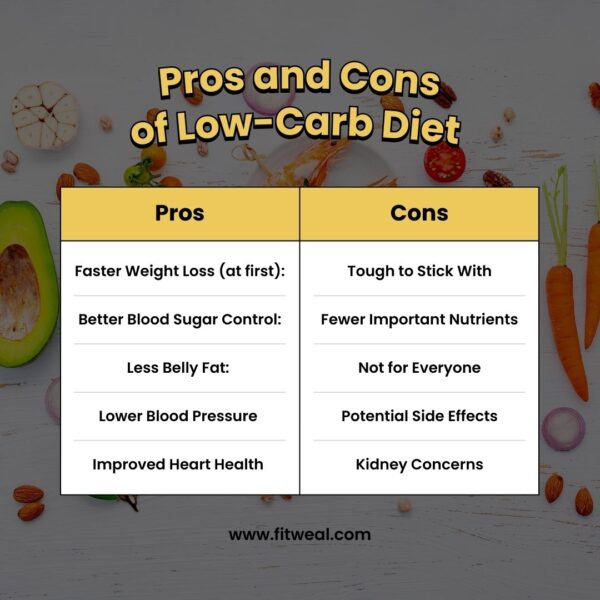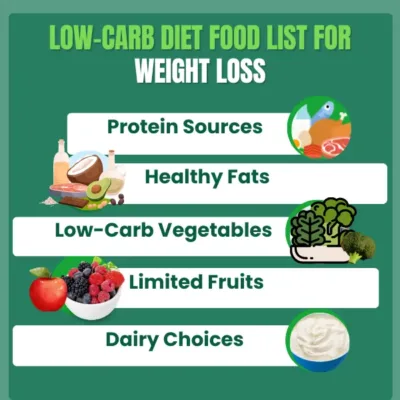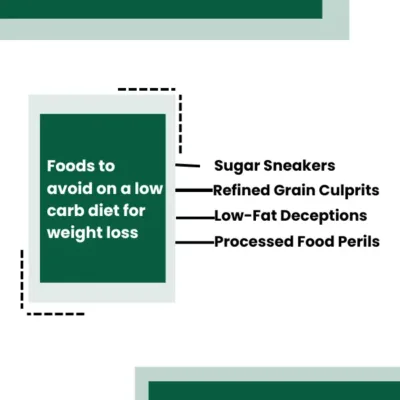
Low carb diet is help to weight loss
yes, a low-carb diet can help with weight loss, especially in the short term. Here’s why:
When you limit carbs, your body starts using stored fat for energy instead of glucose from carbs. This process, called ketosis, can lead to weight loss.
Studies from the National Institutes of Health (NIH) show that low-carb diets can result in more initial weight loss compared to low-fat diets. However, long-term success depends on your overall calorie intake and how much you burn.
No matter the diet you choose (low-carb, low-fat, etc.), weight loss requires a calorie deficit—eating fewer calories than your body needs. You can calculate your daily calorie needs using online tools or by consulting a healthcare professional.
The Dietary Guidelines for Americans 2020-2025 recommend the following macronutrient distribution for most adults:
- 45-65% carbohydrates
- 10-30% protein
- 20-35% fat
The FDA suggests a daily intake of around 275 grams of carbs in a typical 2,000-calorie diet.
Benefits of a Low-Carb Diet
Although complete carb elimination hasn’t been studied, research on very low-carb and ketogenic diets suggests several health benefits:
Pros and Cons of Low-Carb Diet

Although complete carb elimination hasn’t been studied, research on very low-carb and ketogenic diets suggests several health benefits:
| Pros | Cons |
|---|---|
| Faster Weight Loss (at first): Low-carb diets can help you shed pounds quicker than low-fat diets, especially in the short term. | Tough to Stick With: Low-carb plans can be strict and hard to follow over time. You might miss your favorite foods! |
| Better Blood Sugar Control: If you have diabetes or prediabetes, a low-carb diet can help keep your blood sugar levels in check. | Fewer Important Nutrients: Limiting certain foods can mean missing out on fiber, vitamins, and minerals your body needs. |
| Less Belly Fat: Studies suggest low-carb diets might be better than low-fat ones for burning belly fat, which is linked to some health problems. | Not for Everyone: Low-carb diets might not be safe for people with certain health conditions or pregnant/breastfeeding women. Talk to your doctor first! |
| Lower Blood Pressure: Some research shows a connection between reduced carbs and lower blood pressure. | Potential Side Effects: Headaches, feeling tired, constipation, and bad breath are common when starting a low-carb diet. |
| Improved Heart Health: Low-carb diets might improve some heart disease risk factors like blood triglycerides and “good” HDL cholesterol. | Kidney Concerns: For some people, especially those with pre-existing kidney issues, the high protein intake in low-carb diets may put extra stress on their kidneys. |
Low carb diet according to Ayurveda
- Kapha Dosha (Earth & Water): Kapha types tend to have slower metabolisms. They might benefit from moderate carb intake, prioritizing whole grains, legumes (in smaller portions), and some fruits.
- Pitta Dosha (Fire & Water): Pittas have a balanced metabolism. They can manage a wider range of carbs but should focus on cooling foods like fruits and vegetables with moderate whole grains.
- Vata Dosha (Air & Space): Vata types have a fast metabolism. They might tolerate slightly higher carb intake, including whole grains, some fruits, and root vegetables, to balance their airy nature.
Low-Carb Diet Food List for Weight Loss

- Protein Sources:
- Chicken breast, sirloin steak, turkey breast, fish (salmon, tuna, sardines), lean cuts of pork
- Eggs (boiled, scrambled, poached, omelettes)
- Nuts and seeds: Almonds, walnuts, pistachios, chia seeds, flaxseeds (watch portions)
- Healthy Fats:
- Avocados
- Olive oil
- Fatty fish (salmon, mackerel)
- Coconut oil (use sparingly)
- Low-Carb Vegetables:
- Leafy greens: Spinach, kale, arugula, Swiss chard
- Cruciferous vegetables: Broccoli, cauliflower, Brussels sprouts, cabbage
- Other options: Asparagus, zucchini, yellow squash, bell peppers, mushrooms
- Limited Fruits:
- Berries (strawberries, blueberries, raspberries)
- Apples (in moderation)
- Dairy Choices:
- Plain Greek yogurt (unsweetened)
- Full-fat cheese (watch for added sugars in flavored varieties)
Low-Carb Diet Indian Food
Embarking on a low-carb journey doesn’t mean sacrificing the rich flavors of Indian cuisine! Here’s a guide to navigating your favorite curries and dishes while keeping your carb intake in check:
- Tandoori Triumph: Marinated chicken, fish, or prawns (shrimp) grilled in a tandoor oven are protein-packed and naturally low in carbs. Experiment with spice blends like tandoori masala or garam masala for a burst of flavor.
Tikka Masala (Low-Carb Remix): This classic curry can be transformed for a low-carb approach. Swap out regular rice for cauliflower rice, a versatile substitute with a similar texture. Replace sugary tomato sauce with a sugar-free alternative or blend roasted tomatoes for natural sweetness.
Egg Curry Extravaganza: A budget-friendly and protein-rich champion, egg curry is a low-carb gem. Pair it with a side of low-carb vegetables like spinach or roasted cauliflower for a complete and satisfying meal.
Saag Paneer Sensation: Saag, meaning spinach in Hindi, cooked with paneer (Indian cottage cheese), offers a delightful combination of protein and healthy fats. Enjoy it traditionally with a small portion of a low-carb flatbread like almond flour roti, or savor it without bread for a strictly carb-conscious option.
Lamb Rogan Josh Reimagined: This flavorful lamb curry is traditionally served with rice. Embrace a low-carb twist by opting for cauliflower rice or a bed of roasted vegetables like zucchini, eggplant, or bell peppers.
Aloo Gobi (Carb-Conscious Conversion): While the traditional version features aloo (potatoes), create a low-carb masterpiece by replacing them with cauliflower florets. Season generously with turmeric, cumin, and coriander for an authentic touch.
Bhindi Masala Magic: Okra (bhindi) stir-fry is a revelation for low-carb Indian food lovers. This flavorful dish is naturally low in carbs and packed with fiber, making it a perfect side or vegetarian main course.
Stir-Fried Greens Symphony: Sauté spinach, kale, or mustard greens with fragrant spices like mustard seeds and curry leaves for a quick, healthy, and incredibly flavorful side dish.
- Dal Dilemma: Legumes like lentils and chickpeas (dal) are higher in carbs compared to other options. However, you can still enjoy them in moderation. Include smaller portions alongside non-starchy vegetables like broccoli or green beans for a balanced meal that offers protein, fiber, and essential micronutrients.
- Almond Flour Roti: These flatbreads are a game-changer for those seeking low-carb alternatives to traditional wheat rotis. They are gluten-free and boast a lower carb content.
- Coconut Flour Roti: Another excellent low-carb and gluten-free option, perfect for adding variety to your meals.
Foods to Eat on a low carb diets for weight loss

A low-carb diet restricts your intake of carbohydrates, the body’s primary source of energy. To compensate, the body starts burning stored fat for fuel, potentially leading to weight loss. Here’s a breakdown of foods you can prioritize on a low-carb diet:
Protein Sources:
- Meat: Beef, lamb, pork, chicken
- Fish: Salmon, trout, haddock, tuna
- Eggs: Whole eggs (yolks and whites)
- Nuts and Seeds: Almonds, walnuts, sunflower seeds, chia seeds, pistachios (in moderation)
Healthy Fats:
- High-Fat Dairy: Cheese, butter, heavy cream, Greek yogurt (full-fat options)
- Fats and Oils: Avocados, avocado oil, olive oil, coconut oil, lard
Low-Carb Vegetables:
- Non-Starchy Vegetables: Spinach, kale, broccoli, cauliflower, asparagus, tomatoes
Lower-Carb Fruits:
- Berries: Strawberries, blueberries, raspberries, blackberries
- Other: Apples (in moderation)
Foods to Include in Moderation:
- Starchy Vegetables: Potatoes, sweet potatoes, yams, peas, corn
- Higher-Carb Fruits: Bananas, pineapples, mangoes
- Whole Grains: Brown rice, oats, quinoa
- Legumes: Lentils, black beans, pinto beans, chickpeas
- Higher-Carb Dairy: Milk and full-fat yogurt

Foods to avoid on a low carb diet for weight loss
While you can enjoy a variety of delicious foods on a low-carb diet, certain options can hinder your weight loss goals. Here’s what to limit or avoid:
Sugar Sneakers: Candy, ice cream, baked goods, and sugary drinks are loaded with refined carbohydrates and added sugars, causing blood sugar spikes and hindering weight loss.
Refined Grain Culprits: White rice, white bread, pasta, tortillas, and crackers are all high in refined carbohydrates. These can be quickly digested, leading to hunger pangs and cravings.
Low-Fat Deceptions: Diet and low-fat products often compensate for reduced fat content with added sugars. Opt for full-fat options and control portions instead.
Processed Food Perils: Convenience meals, fast food, chips, cookies, and pretzels are typically loaded with unhealthy fats, refined carbohydrates, and added sugars. Avoid these whenever possible.


